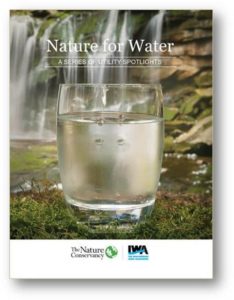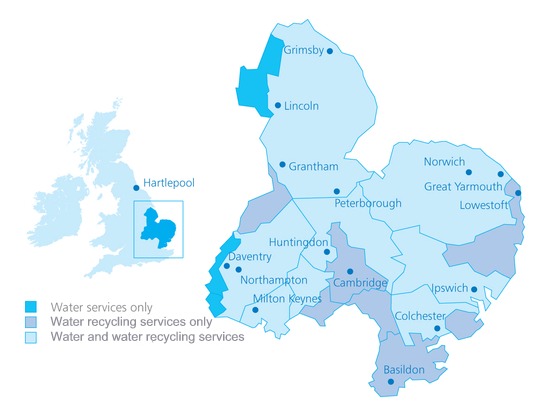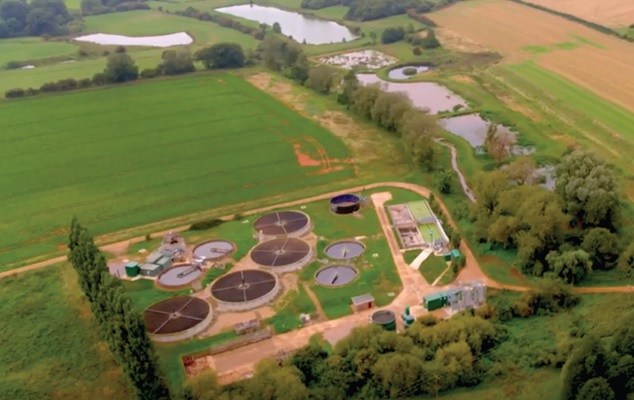This spotlight is part of a series of utility case studies intended to shed light on the opportunities and challenges facing regulators and water utilities in their efforts to incorporate nature-based solutions into water management. Access the publication here – Learn more about the partnership between IWA and The Nature Conservancy here.
spotlight is part of a series of utility case studies intended to shed light on the opportunities and challenges facing regulators and water utilities in their efforts to incorporate nature-based solutions into water management. Access the publication here – Learn more about the partnership between IWA and The Nature Conservancy here.
Prioritising natural capital approaches
Many interested yet hesitant utilities and regulators cite a lack of evidence that nature-based solutions can deliver water quality and quantity results. Chris Gerrard, Natural Catchment and Biodiversity Manager at Anglian Water, argues that there is sufficient information and utility success stories available for that to no longer be an acceptable excuse:
 From a water company’s perspective, there’s enough information out there to start applying nature-based solutions programs. We can’t hide behind the argument that it’s too risky. It’s no longer an acceptable excuse. We should aim to collaborate where we can, given the competitive environment in which UK water companies work. We need to collaborate and share experiences because it helps develop the knowledge base in a way that we can all benefit in the long run.”
From a water company’s perspective, there’s enough information out there to start applying nature-based solutions programs. We can’t hide behind the argument that it’s too risky. It’s no longer an acceptable excuse. We should aim to collaborate where we can, given the competitive environment in which UK water companies work. We need to collaborate and share experiences because it helps develop the knowledge base in a way that we can all benefit in the long run.”
 Anglian Water is the largest water and water recycling company by geographic area in England and Wales, and it is located in a region of the country that receives, on average, a third less rainfall than the rest of England. The company is committed to solving environmental problems at source and water quality threats prompted evaluation of nature-based approaches to water management. Contrary to concerns about the cost-effectiveness of NBS, the Anglian Water case study demonstrates how these programs can actually save money for business and customers. Their experience showcases the critical role of customer engagement and how strengthening the relationship between utilities and the general public can create avenues to prioritize natural capital approaches.
Anglian Water is the largest water and water recycling company by geographic area in England and Wales, and it is located in a region of the country that receives, on average, a third less rainfall than the rest of England. The company is committed to solving environmental problems at source and water quality threats prompted evaluation of nature-based approaches to water management. Contrary to concerns about the cost-effectiveness of NBS, the Anglian Water case study demonstrates how these programs can actually save money for business and customers. Their experience showcases the critical role of customer engagement and how strengthening the relationship between utilities and the general public can create avenues to prioritize natural capital approaches.
How did a company that operates a quarter of all water and water recycling treatment works in England and Wales approach the topic of NBS?
The first step in designing an effective program was to gather a scientifically informed body of research on the problems facing natural capital in the region. Combining strong scientific evidence with the experience of other utility case studies has allowed Anglian Water to identify effective interventions. This exercise of diagnosing pressures on natural capital stocks, mapping the catchments where intervention was most needed, and then sharing this information with relevant local stakeholders was an essential building block for implementation.
Strong mandates from the community and local organizations to implement nature-based solutions are a powerful component of the Anglian case study. A clear example of this local pressure is illustrated through the initiative of a local charity focused on catchment-based approaches, the Norfolk Rivers Trust. With financing from Anglian Water, the Trust pioneered the construction of a wetland treatment site that improves treated effluent before allowing it to return to the River Ingol. The wetland filters water after it has passed through the existing treatment plant to ensure it meets high quality standards, replacing the need for conventional, energy intensive infrastructure. It is the first of its kind in England.
The Trust recognized the potential for this project to generate cost savings, reduce carbon emissions and increase wildlife in the area. It provides an excellent solution to removing unwanted chemicals in a natural way, rather than through additional chemical treatment or infrastructure, which would additionally raise costs for customers. The success of this pilot project gave Anglian Water the confidence to further promote NBS, both internally as a company and externally to industry regulators. The company recently unveiled proposals for the development of dozens of wetlands for wastewater treatment in its next business plan period 2020-2025. In the UK, public pressure for catchment protection extends beyond local environmental organizations. Anglian Water initiated an ambitious and targeted customer engagement strategy to assess the level of support for NBS in their communities. Customers responded positively, encouraging the company to engage in greater awareness raising efforts.
“The more we inform our customers about what we do, the more they appreciate the challenges we face as a company and the challenges growth and climate change present to the environment. When they have that level of understanding, we get the highest level of support for NBS, because customers understand the full potential benefits and recognize their role in solving them”, Chris comments.
Anglian Water’s £500,000 wetland is protecting Norfolk’s River Ingol from waste water pollution @CRTSouthEast @CanalRiverTrust @BarrySheerman @MayorofLondon @edie @theWSBF https://t.co/TZpnYkJNSB
— Kaj Embren (@KajEmbren) August 25, 2018
It is well supported that multi-stakeholder networks are important to the design, planning and implementation of NBS programs. However, water utilities frequently cite tense relations with farmers when catchment protection activities involve product stewardship or significant financial investment from the agricultural sector is required. To combat these tensions, Anglian Water employs appropriately qualified advisors to speak to farmers about their practices. Partnership building involves dedicated catchment advisors with an agricultural or farming background forging relationships with farm managers. Framing conversations in a way that meets the interests, concerns and priorities of these stakeholders has allowed Anglian to achieve its aims for catchment protection. The Slug it Out Campaign (see below) is evidence that this approach has been highly successful. The model of delegating appropriate staff to engage meaningfully with farmers addresses the perception that large water companies are disconnected from the populations they serve. This is a promising strategy for building a strong and engaged multi-stakeholder network.
Slug it Out: healthy crops, healthy water
Anglian Water launched the Slug it Out campaign to reduce the levels of a commonly used slug control pesticide called metaldehyde from entering the region’s raw water supplies. The EU’s Water Framework Directive has a strict target on metaldehyde levels, one that is regularly exceeded in the region’s reservoirs. Failure to tackle this issue early on carried the potential for tougher enforcement of regulations on farmers. Anglian committed to a proactive approach to support local farming communities while protecting customers and the natural environment.
The trial program incentivized farmers to not use metaldehyde. Through awareness-raising campaigns and payment for participation, the program was highly successful and significantly cheaper than upgrading water treatment works. By the third year of the metaldehyde-free farming, the trial saw a 94% drop in levels of the chemical detected in reservoir tributaries.
Slug it Out has resulted in a significant year on year reduction in metaldehyde levels at all reservoirs within the trial areas, with a 94% overall reduction in levels in samples since 2015; and the majority of raw water sources are now compliant with Drinking Water Directive (DWD) standards. The trials also demonstrate that to achieve compliance with DWD standards – agricultural metaldehyde must not be applied at all, thereby proving that to be effective, either voluntary or mandatory use restrictions are required.
As Brexit discussions leave a high degree of uncertainty around future water quality standards and compliance in the UK, Chris Gerrard reflects on how the EU’s regulatory environment can better support NBS adoption.
“We play our part in protecting and improving water quality. Right now we often have to use chemical and energy-intensive treatment to do this; improving the water environment but impacting other elements of the natural world. We’d like to see NBS mainstreamed where we can jointly agree with the regulator it’s the best approach for the environment as a whole, even if they don’t work as consistently as a traditional solution”.
While a NBS approach might not deliver the required water quality parameters in a given month or year, there are nature-based metrics indicating co-benefits. The key, and challenge, behind regulation is providing regulators with real data. Anglian Water seeks to devise a new approach with the Environment Agency that allows projects like the wetland wastewater treatment facility to become the rule, rather than the exception. Irrespective of how this materializes, their 2020-2025 Business Plan will build on the success of the past 5 years to further embed natural capital approaches into decision-making.
 For utilities struggling to prioritize NBS in their corporate agenda, the case of Anglian Water provides a strong evidence base. Regulatory requirements such as the EU Water Framework Directive provided a starting point for Anglian Water to move away from end of pipe solutions and think about water issues at a catchment level. However, it’s clear that the growth of Anglian’s innovative program goes beyond regulatory compliance. A company commitment to sustainability, community driven pilot studies and customer pressure to deliver environmentally-friendly solutions have been vital elements to support the mainstreaming of NBS.
For utilities struggling to prioritize NBS in their corporate agenda, the case of Anglian Water provides a strong evidence base. Regulatory requirements such as the EU Water Framework Directive provided a starting point for Anglian Water to move away from end of pipe solutions and think about water issues at a catchment level. However, it’s clear that the growth of Anglian’s innovative program goes beyond regulatory compliance. A company commitment to sustainability, community driven pilot studies and customer pressure to deliver environmentally-friendly solutions have been vital elements to support the mainstreaming of NBS.
Nature for Water: Spotlight on a UK Utility and Regulators
Showcasing water utility experiences and sharing knowledge supports effective policy making and regulation to accelerate the adoption of Nature Based Solutions in water management. IWA and TNC are catalysing action between water utilities and their regulators by bringing these lessons and guidance into tangible practice among network members.


